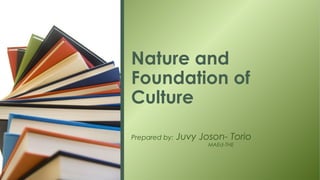
Nature & Foundation of Culture
- 1. Nature and Foundation of Culture Prepared by: Juvy Joson- Torio MAEd-THE
- 3. What is Culture? • Culture is the way of life of a group of people.
- 4. • is a bond that ties the people of a region or community together. • includes the traditions we inherit and pass on to the next generation. • refers to the pattern of human activity and symbols that give significance to these activities.
- 5. B Behavior B Beliefs V Values that makes the totality of man - and man way of being a human.
- 6. Elements of Culture • Language • Shelter • Clothing • Economy • Religion • Education • Values • Climate • Government/Laws • Recreation/Entertainment
- 7. Education -the development of the mind and character through study and training
- 8. Language - spoken or written words; human speech
- 9. Shelter - something that protects from the weather or from danger.
- 10. Clothing -things worn to cover the body
- 11. Economy - the way that money and goods are used by people
- 12. Religion -a system of beliefs that goes beyond human powers
- 13. Values - ideals or beliefs that guide the way people live
- 14. Climate - the usual weather that a place has
- 15. Government/Laws - rules made and enforced by the government of a country -
- 16. Entertainment/Recreation -something that is done for fun or relaxation
- 17. Characteristics of Culture Shared Group product Learned and compulsory CULTURE taught Commulative diverse dynamic
- 18. Culture is learned • People are born with basic needs – needs that create and shape behavior – but how they go about meeting those needs and developing behaviors to cope with them is learned.
- 19. Culture is Shared • If a culture is to endure, it must make certain that its crucial messages and elements are not only shared, but they also must be passed on to future generations. • Any break in the learning chain would lead to a culture's disappearance.
- 20. Culture is Dynamic • Cultures do not exist in a vacuum; because of "other waters continually flowing in," they are subject to change.
- 21. Culture is an Integrated System • Culture "is composed of parts that are related to each other" and function as an integrated whole. • All aspects of culture must be reasonably well integrated in order to function properly.
- 22. Culture is an Compulsory - Culture composed of existing law that you must to do it or accept it. - Example are Woman and Child Abuse Law
- 23. Culture is an Comulative - they learned cultural knowledge in previous generation - Ex. Mathematical insights from Achimedes and Phytagoras.
- 24. Culture is Diverse - different from each other. - We did not follow some belief or we diffuse or neglect some beliefs.
- 25. Development of Culture 1. Innovation • discovery and invention 2. Diffussion • process of spreading the culture everywhere
- 26. Material and Non Material Culture • Material culture culture reflects a society’s values and a society’s technology, the knowledge that people apply to the task of living in their surroundings. Examples include books, buildings, physical objects that future generations can use to try and understand us. •Non Material Culture reflects beliefs, values, concepts, customs Examples include Beliefs, values, Religions, ethics and philosophies
- 27. Types of Cultures ● High culture refers to cultural patterns that distinguish a society’s elite. ● Popular culture designates cultural patterns that are widespread among a society’s population.
- 28. ● Subcultures are cultural patterns that distinguish some segment of a society’s population. They involve not only difference but also hierarchy. •Countercultures refers to cultural patterns that strongly oppose those widely accepted within a society. Countercultures reject many of the standards of a dominant culture.
- 29. •Virtual Culture Today’s children are bombarded with virtual culture, images that spring from the minds of contemporary culture-makers and that reach them via a screen. Some of these cultural icons embody values that shape our way of life. But few of them have any historical reality and almost all have come into being to make money.
- 30. A people without the knowledge of their past history, origin and culture is like a tree without roots. Marcus Garvey
- 31. Thank you and God bless us all…